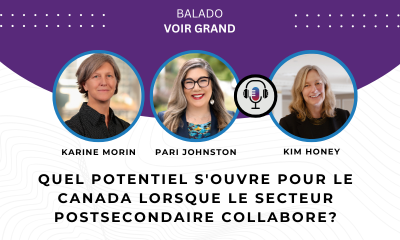Social Sciences and Humanities at the Forefront: Leading High-Risk/High-Reward Interdisciplinary Research brought together four scholars leading projects funded through the New Frontiers in Research Fund’s (NFRF) Exploration stream: Dr. Juan Sanchez Martinez, Dr. Michael Byers, Dr. Veronica Pacini-Ketchabaw, and Dr. Cristina Delgado Vintmilla. Although the subjects of their projects vary — Indigenous approaches to the Western literary and visual canon, outer space, and mining — they are connected through their shared pursuit for social justice.
Through the creation of his anthology, for instance, Dr. Martinez strives “to dialogue ways that Indigenous approaches can be brought to, and interact with, Western canons.” In doing so, he is essentially “build[ing] intercultural and multilingual bridges.” Dr. Byers, through his project, aims to “educate governments around the world, and especially in the Global South, to eliminate free riding”— that is, uncontrolled re-entries of rockets that are launched now and in the future. Finally, through their work, Drs. Pacini-Ketchabaw and Vintmilla are “seeking to understand more deeply the situation and devastation caused by giant mines.” As Dr. Pacini-Ketchabaw so poignantly expressed, the paradox of mining is that it “promises future prosperity but also hinders the possibility of a future for the land.”
Following a brief introduction to each of their projects, the scholars launched into a discussion on conducting interdisciplinary research. Dr. Byers’ advice to perspective applicants of the NFRF was to “be prepared to do a great deal of learning.” Given his own expertise in international law, he noted that he relies on his research partner and co-author to tutor him in physics. He further added that although interdisciplinary research takes a great deal of time and effort, it is “very exhilarating.” Building on Dr. Byers’ advice, Dr. Vintmilla stated that interdisciplinary research “pushes us to cross bridges and redefine our work and also intensify our commitments.” Dr. Pacini-Ketchabaw focused her comments on the interdisciplinarity of participants’ lives, inspiring her team not to follow “a colonial, modern way of separating knowledge into pre-defined categories.” Dr. Martinez, through his contribution, reminded listeners that relationality comes naturally in Indigenous Studies and that “everything is connected.” He concluded the discussion by urging future applicants of the NFRF to be open to the “tensions and contradictions” that come with interdisciplinary research.
Overall, for these scholars, the rewards of interdisciplinary research certainly outweigh the risks!

Quel potentiel s'ouvre pour le Canada lorsque le secteur postsecondaire collabore?
← Page d'accueil du balado Voir Grand Introduction | À propos des invitées | Retranscription | Suivez nous Introduction L’avenir du Canada se dessine dans les lieux où les individus apprennent et dans la manière dont ces lieux sont reliés entre eux...

Le leadership du Canada en matière d'IA nécessite la participation de tou.te.s les expert.e.s
Après avoir réuni des experts en IA issus des sciences humaines pour une consultation avec le groupe de travail sur la stratégie en matière d'IA du gouvernement fédéral le 20 octobre, la Fédération a soumis le document suivant le 31 octobre...

Bâtir un avenir solide pour la recherche grâce au Budget fédéral 2025
Le 4 novembre 2025, le gouvernement fédéral a déposé son Budget 2025 « Un Canada fort ». De par son investissement visant à attirer des talents internationaux, ce budget reconnait l’importance cruciale du travail des chercheur.euse.s. Le Budget 2025...
